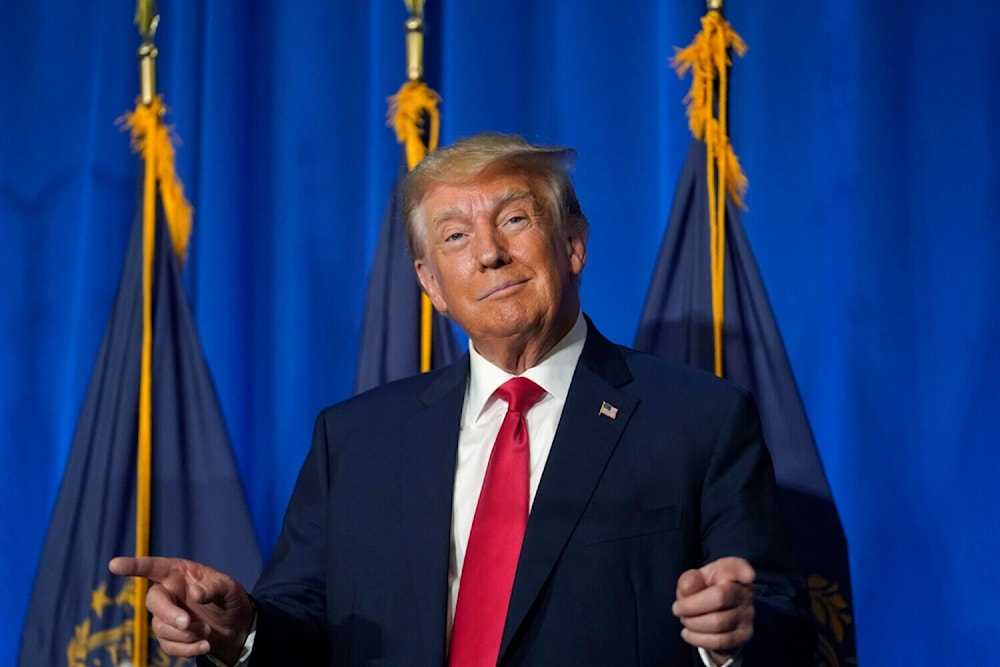EU leaders worried Trump's re-election heralds NATO collapse: NYT
European states have allegedly sent envoys to the United States to ascertain the former President's position on NATO.
-

Former President Donald Trump speaking in New Hampshire in June 2023 (AP)
EU diplomats and think tank officials have begun contacting former US President Donald Trump's associates to determine whether he will withdraw the US from NATO if re-elected, a report by The New York Times revealed.
With polls suggesting that Trump may be the primary contender for the Republican party, a slew of former Trump administration officials and anti-Trump commentators have declared that a second Trump presidency would spell the end of NATO, and that worry has spilled over to the EU.
In mid-November, a Michigan state court ruled that former Trump is eligible to stay on the state's 2024 presidential primary ballot for the Republican Party after a local activist group Free Speech for People attempted to bar Trump from running for office by filing an “insurrection” lawsuit against him.
Anonymous sources told The New York Times that “European ambassadors and think tank officials have been making pilgrimages to associates of Mr. Trump to inquire about his intentions."
Finland's ambassador to the US, Mikko Hautala, reportedly spoke to Trump and "sought to persuade him of his country's value to NATO as a new member."
Other nations are anticipated to try to gain Trump's favor through "flattery and transactional tributes," according to The Times, citing talks with current and former diplomats.
Trump has not threatened to withdraw the United States from NATO but raged against the bloc's European members, accusing them of freeloading on the US enormous military presence on the continent, while failing to achieve NATO's 2% of GDP defense budget objective. Trump used NATO conferences to chastise European leaders for increasing military expenditure, and according to former National Security Advisor John Bolton, the US was ready to exit the alliance in 2018.
His national security advisor, Robert O’Brien, and Republican Senator, Lindsey Graham, told The Times that such rhetoric was only aimed at pressuring European members into achieving the bloc's goals.
Trump previously told The Times that US presidents have an "obligation" to ensure the alliances of the US "serve the people of the country."
In his statement to The Times, Trump wrote that “it is the obligation of every US president to ensure that America’s alliances serve to protect the American people, and do not recklessly endanger American blood and treasure,” adding that his “highest priority” would be “the defense of our own country, our own borders, our own values, and our own people.”
This statement is consistent with Trump’s long-standing view that American troops should not be “the policemen of the world.”
While he did not initiate any new foreign wars in his tenure, he did order several strikes in Syria, Afghanistan, and Iraq, the most prominent of which was the strike against IRGC al-Quds Force Commander martyr Lieutenant General Qassem Soleimani and his Iraqi trench-mate and the second-in-command of Iraqi Popular Mobilization Units (PMU), Abu Mahdi al-Muhandis., and he did attempt to withdraw American troops from all three countries.
Read next: US, others ordered to pay $50bln in damages over Gen. Soleimani case
Trump's former Defense Secretary, Marc Esper, warned MSNBC on Thursday that Trump's anti-interventionism will eventually lead to NATO's demise. If Trump withdraws military backing for Ukraine, the entire attempt to support Ukraine in its war with Russia "would eventually crumble," as would the alliance itself if Trump withdraws soldiers from Europe.
He has often expressed he could have influenced a cessation of the war in Ukraine within 24 hours by negotiation if he were still president, adding that the war would not have happened if he were still in his position.

 4 Min Read
4 Min Read










